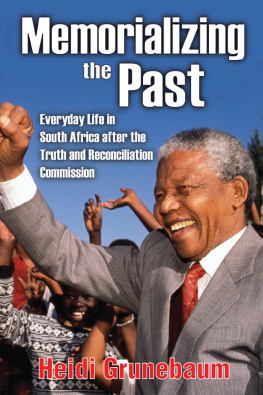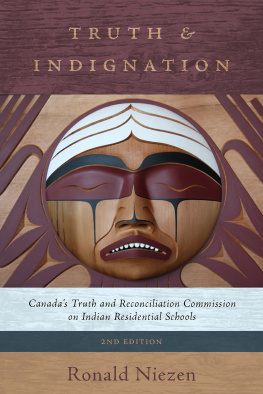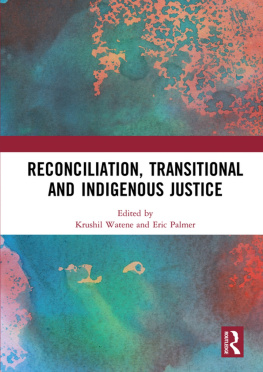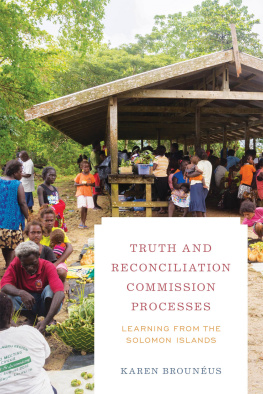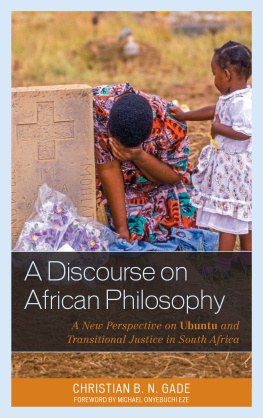First published 2011 by Transaction Publishers
Published 2017 by Routledge
2 Park Square, Milton Park, Abingdon, Oxon OX14 4RN
711 Third Avenue, New York, NY 10017, USA
Routledge is an imprint of the Taylor & Francis Group, an informa business
Copyright 2011 by Taylor & Francis.
All rights reserved. No part of this book may be reprinted or reproduced or utilised in any form or by any electronic, mechanical, or other means, now known or hereafter invented, including photocopying and recording, or in any information storage or retrieval system, without permission in writing from the publishers.
Notice:
Product or corporate names may be trademarks or registered trademarks, and are used only for identification and explanation without intent to infringe.
Library of Congress Catalog Number: 2010024040
Library of Congress Cataloging-in-Publication Data
Grunebaum, Heidi.
Memorializing the past : everyday life in South Africa after the Truth and Reconciliation Commission / Heidi Peta Grunebaum.
p. cm.
Includes bibliographical references and index.
ISBN 978-1-4128-1473-7 (alk. paper)
1. South Africa. Truth and Reconciliation Commission. 2. Post-apartheid era--South Africa. 3. Apartheid--South Africa--History. 4. Memory--Social aspects-South Africa. 5. South Africa-Race relations. 6. Reconciliation-Social aspects--South Africa. I. Title.
DT1974.2.G78 2010
968.06--dc22
2010024040
ISBN 13: 978-1-4128-1473-7 (hbk)
This work has emerged, in its current form, after a long incubation. At times it has taken the phantasmic shape of a golem. At other times, it seemed as if it would be stillborn. That it exists in these words is due to the encouragement, support, patience and, sometimes, tough prodding of many special people. My largest debt is to Yazir Henri, friend, colleague, interlocutor and soul-mate. Each chapter of this work is infused with the spirit of years of shared inquiry, intellectual labor, collaborative writing, ongoing dialogue, and working together. I am deeply grateful to Brian and Leonie Grunebaum, who have unquestioningly supported me and encouraged me to live, think and act in the world, outside of the received ideas and worldviews of the privileged classes. For this and much more I thank them. For fierceness, honesty, unrequited support and reminding me to play, I thank my daughter, Arielle Ralph. Born one month after the TRCs final report was handed to the then President of South Africa, Nelson Mandela, she has grown up with this project as if it were another sibling. Arielle has written three books, plans more, and cannot understand why I spend so many hours writing yet still have not made one.
This book would not have a life in this way if not for the existence of the Direct Action Centre for Peace and Memory (DACPM). Between 1999 and 2006 the DACPM was a generous institutional space and intellectual home for me. In this, my colleagues who founded the centre in 1998, Yazir Henri, Mxolisi Mbilatshwa and Nkululeko Booysen, succeeded beyond their own expectations to establish and sustain a creative intellectual and vibrant activist space. With this book I am accountable to their ongoing work. It is my hope that this text is an expression of my commitment to my word as well as to bonds of trust, hope and solidarity with the founders of the DACPM and my colleagues, Vuyani Mamani, Lizo Ndzabela, and Mzoxolo Ndita.
A number of people, who in different waysas friends, colleagues, intellectuals, teachers, as seekers of knowledge, as social and political activists, often as all of thesehave supported, taught and inspired me. I am indebted to Patricia Hayes, in particular, for the above and much more. I may only fully come to understand what they have imparted to me in the course of my own life: Isabel Balseiro, Shifra Jacobson, Alejandro Castillejo-Cuellar, Usche Merk, Premesh Lalu, Marianne Hirsch, Scott Veitch, John Stratton, David Bunn, Steven Robins, Undine Kaiser, Oren Stier, Vije Franchi, Michael Weeder, Sue Cooper, Doro Peyko, Paul Hendricks, Susan Spearey, Suren Pillay, Zuleiga Adams, Claudia Braude, Erhard Eller, Theodore Kamwimbi, and James Williams.
A generous Mellon postdoctoral fellowship in the Programme for the Study on Humanities in Africa at the Centre for Humanities Research, University of the Western Cape, from 2007 to 2009, enabled me to revise the manuscript. My thanks are due to Premesh Lalu, Lameez Lalkhen, Anette Hoffman, Paolo Israel, Lizzy Attree, Charles Kabwete, Mzuzile Mduduzi Xakaza, Jill Weintroub, Zulfa Abrahams, Riedwaan Moosage and Annachiara Forte of the PSHA for providing a vigorous and thoroughly engaging space for debate, discussion and disagreement through our reading groups, seminars, coffee sessions and colloquia. In 2008 and 2009, Patricia Hayes and I organized a series of colloquia at the Centre for Humanities Research and the History Department, University of the Western Cape, on War and the Everyday. The thoughtful discussions during and after the colloquia challenged my own thinking about the epistemological questions, methodological stakes, and ethical knots in theorizing the violence of war at its material and temporal conjunctions with the everyday.
A portion of the research of this book was completed during a visiting research associateship at the Centre for African Studies at the University of Cape Town between July 2005 and May 2006. I am grateful to Brenda Cooper, as well as to Harry Garuba and Nick Shepherd, my current colleagues at CAS for providing me with a supportive and collegial environment in which to reflect, research, and write.
The section of chapter two on reconciliation draws from my essay, Talking to Ourselves Amongst the Innocent Dead: On Reconciliation, Forgiveness and Mourning in PMLA. 117.2 (March) 2002: 306-310. A part of chapter four on the uncovering of and contestations around the Prestwich burial ground has appeared as Unburying the Dead in The Mother City: Urban Topographies of Erasure in PMLA, special issue on Cities, 122.1 (January) 2007, pp 210-219. I appreciate the PMLAs permission to use that material. A condensed and earlier version of appeared as, Re-placing Pasts, Forgetting Presents: Narrative, Place and Memory in the Time of the Truth and Reconciliation Commission in Research in African Literatures (32, 3, Fall 2001), pp. 198-212. I thank Research in African Literatures for permission to reproduce parts of that essay.
The financial assistance of what was previously the Centre for Science Development (HSRC, South Africa), and now the NRF (National Research Foundation) towards early parts of this research is hereby acknowledged. The opinions expressed and conclusions arrived at are my own and not necessarily to be attributed to the Centre for Science Development/NRF.
The year 2010 marks the passage of twenty years since the formal capitulation of the apartheid regime. Regardless of what the limits to structural change that the negotiated political transition process and the current form of democracy may be, the defeat of apartheid was and remains a moral victory. Legal apartheid was ended because of many decades of struggle, rebellion, direct action, and vocal dissent, solidarity on the continent, the Diaspora and elsewhere, and international pressure. Apartheid was ended through the continuing and tireless efforts of generations of ordinary people for which the human cost is yet to be accounted.


